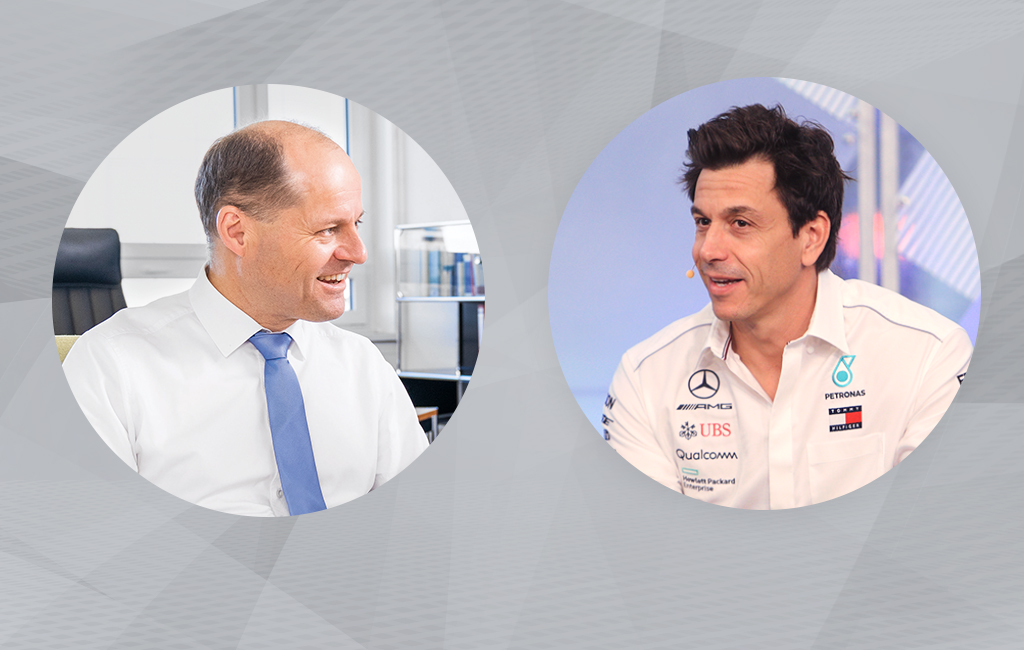How important is Teamwork for success in your business?
Johannes Pfeffer: Our interaction with key customers is getting increasingly versatile and complex. While we offered a relatively fixed product portfolio in the past, we nowadays provide advice to our clients on specific designs, options and variations, tailor-made to the application needs of our clients. We are now talking about solutions. In order to successfully develop, sell and produce a solution, we obviously need individual contributions from different functions, with different capabilities and skill sets – often coming from different locations. Only if these contributions merge harmoniously together to one seamless value stream, a business can be successful. Or said differently: Teamwork is not only one factor, it’s the factor for success in our business.
“Teamwork is not only one factor, it’s the factor for success in our business.”
Johannes Pfeffer, Spokesman of the Management Board at ebm papst St. Georgen
Toto Wolff: Team work is also absolutely vital to succeed in Formula OneTM. In such an intense sport, even when technology might seem the prime factor to success, we would not be able to win without our people. At Mercedes-AMG Petronas Motorsport, we put a lot of effort into recruiting, retaining and developing the vast numbers of highly intelligent people that work at our two factories in Brackley and Brixworth.
How do you manage to organize collaboration in your teams?
Toto Wolff: Managing a team of this size is all about effective communication. We can have well over one hundred people travelling round the globe at any one time, plus nearly 1500 working away at the factories, so you have to make sure everyone is in the loop and communicating with each other. We have daily debriefs from the track back to the factory and always get all of the staff together to talk through each race as soon as we are back in the factory, regardless of the result.
“We have daily debriefs from the track back to the factory and always get all of the staff together to talk through each race as soon as we are back in the factory, regardless of the result.”
Toto Wolff, Team Principal & CEO of Mercedes-AMG Petronas Motorsport
Johannes Pfeffer: I perfectly agree with Toto. It’s all about communication. Effectively leading large teams means above all to ensure communication. It starts with the staffing process in which the often referred to ‘soft-skills’ are getting higher attention than technical skills. It also means that executives need to spend a substantial amount of time to talk to their teams, to explain the goals and directions for each individual person but also for the team.
I realized in my role that the one thing I need to do right is communication. Effective leaders know that they need to permanently review frequency, style and content of their team communication, they need coaching and practice. My personal ‘continuous improvement process’, CIP, is a continuous communication process, CCP. From CIP to CCP so to say.
How do you focus many individuals to one goal?
Toto Wolff: Bringing hundreds of people together to work towards one aim over a sustained period is not an easy task but we take an open and proactive approach to management, with regular staff debriefs, an open door policy, empowering our people, and of course, trying to lead by example.
Johannes Pfeffer: In this context I’m a bit envious at Toto. I think it’s much easier for a Formula OneTM team to define their goals. All team members understand that there is one goal – it is simple and clear: The team wants to win the race and jump on the winner´s podium!
In the corporate sector it isn’t so easy and obvious to clearly define this one goal. We often limit ourselves to formulating figures, data and facts as a goal. I frequently observed that in the communication about targets and goals we pay too much attention to the company’s key financial figures. To compare again with the Formula OneTM world: Imagine a situation where during the ongoing race, the pit crew decides to send the following message to the driver on the team radio: “Team budget exceeded by 10 %”. Guess how irritated the driver will be!
“The task of communicating a goal to a large team is not difficult, the challenge is to define and set it in a truly inspiring way!”
Johannes Pfeffer, Spokesman of the Management Board at ebm papst St. Georgen
I think we should take the Formula OneTM example as a role model and set simpler, clearer and more tangible goals. We should set goals which create this ‘winner feeling’ for everybody involved and we have to ensure that everybody understands and accepts them as a contribution to something great. So, what I want to say is that the task of communicating a goal to a large team is not difficult, the challenge is to define and set it in a truly inspiring way!

Leave a comment